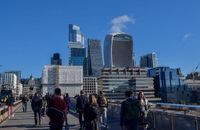The FTSE 100 index surged on Thursday, April 10, 2025, as global markets reacted positively to U.S. President Donald Trump’s unexpected decision to pause tariffs for 90 days on countries that had not retaliated against previous U.S. import tariffs. This marked a significant shift in trade policy, just a day after Trump had implemented steep new tariffs on most trading partners, signaling a potential easing of tensions in the ongoing trade war.
As trading opened in London, the FTSE 100 climbed over 6%, reaching an increase of nearly 500 points at its peak. The index ultimately closed up 5.4% at 8,097.60, reflecting a wave of optimism among investors. The FTSE 250 also saw gains, rising 5.7% to 18,907.16. Analysts pointed to the announcement as a crucial factor in restoring market confidence, with Matt Britzman, a senior equity analyst at Hargreaves Lansdown, noting, “The White House has finally seen some sense and given a whole host of countries a 90-day pause, with reciprocal tariffs immediately lowered to 10%, while isolating China in a tense battle.”
However, the situation remains complex. While Trump’s decision to pause tariffs brought relief to many, it simultaneously raised tariffs on Chinese imports to a staggering 125%. This move has further escalated tensions between the U.S. and China, with Beijing vowing to “fight to the end” if a compromise cannot be reached. He Yongqian, a spokesperson for China’s Commerce Ministry, stated, “The door to dialogue is open, but it must be based on mutual respect and conducted in an equal manner.”
Across Europe, markets mirrored the positive sentiment from London. Germany’s DAX climbed 8.3%, while France’s CAC 40 jumped 7.6%. The pan-European STOXX 600 index also saw a significant rise, increasing by 7.3%, marking its largest single-day gain since March 2020.
In the U.S., the S&P 500 had its third-best day since 1940, closing up 9.5% on Wednesday, April 9, 2025. Wall Street’s recovery was attributed to the optimism surrounding the tariff pause, despite the looming uncertainty regarding China. Major tech companies saw substantial rebounds, with Apple gaining 15% and Tesla surging 22%. This shift in sentiment was echoed in Asian markets, where Japan’s Nikkei index rose by 9.1% and Taiwan’s Taiex increased by 9%.
Despite the positive market reactions, analysts warn that Trump’s trade policies have created a climate of uncertainty that could have lasting ramifications. Michael Brown, Senior Research Strategist at Pepperstone, commented, “It seems that, contrary to many public protestations that he doesn’t pay attention to equity markets, he does.” This sentiment was shared by Marcus Brookes, Chief Investment Officer at Quilter Investors, who noted, “Trump is gaining a reputation now for flip-flopping on tariffs and not having a consistent economic policy.”
In the UK, Prime Minister Keir Starmer responded to the market shifts by emphasizing the need for a proactive approach amidst global economic uncertainty. He stated, “This Government is ambitious for Britain… and I’m not going to stand here and pretend that tariffs are good news.” Starmer’s remarks reflect a broader recognition among leaders that the economic landscape is changing rapidly, necessitating adaptive strategies.
Meanwhile, the impact of Trump’s tariffs has extended beyond the stock markets. Reports indicate a significant decline in UK construction activity, with the amount of office space under construction dropping to its lowest levels in over 15 years. Developers initiated only 4.3 million square feet of office projects in the year ending March 31, 2025, a staggering 57% decrease from the previous year. This downturn raises concerns about the broader implications for the UK economy, particularly as businesses grapple with the uncertainty surrounding trade policies.
As global markets react to the evolving trade landscape, the dollar has also felt the effects of Trump’s announcement. The U.S. dollar fell against both the pound and the euro, losing over 1% against the European single currency. This decline reflects investor apprehension about the potential long-term economic damage stemming from trade tensions.
Looking ahead, the European Union has responded to Trump’s tariff pause by delaying its counter-tariffs against the U.S. for 90 days, as EU Commission President Ursula von der Leyen stated, “We want to give negotiations a chance.” This move is seen as an olive branch, suggesting a willingness to engage in dialogue rather than escalating the trade conflict.
However, experts caution that the underlying issues remain unresolved. Kemi Badenoch, a Tory leader, remarked on the potential fallout from Trump’s extreme tariffs on China, asserting that they could “create problems for everybody.” The uncertainty surrounding these policies continues to loom large over economic forecasts, with bond investors like Pimco warning that the U.S. economy may face a recession in the latter half of the year, regardless of the tariff pause.
In conclusion, while the pause on tariffs has sparked a wave of optimism in the markets, the complexities of international trade relations, particularly with China, remain a significant concern. The coming weeks will be critical as stakeholders assess the impact of these developments on global economic stability and growth.







